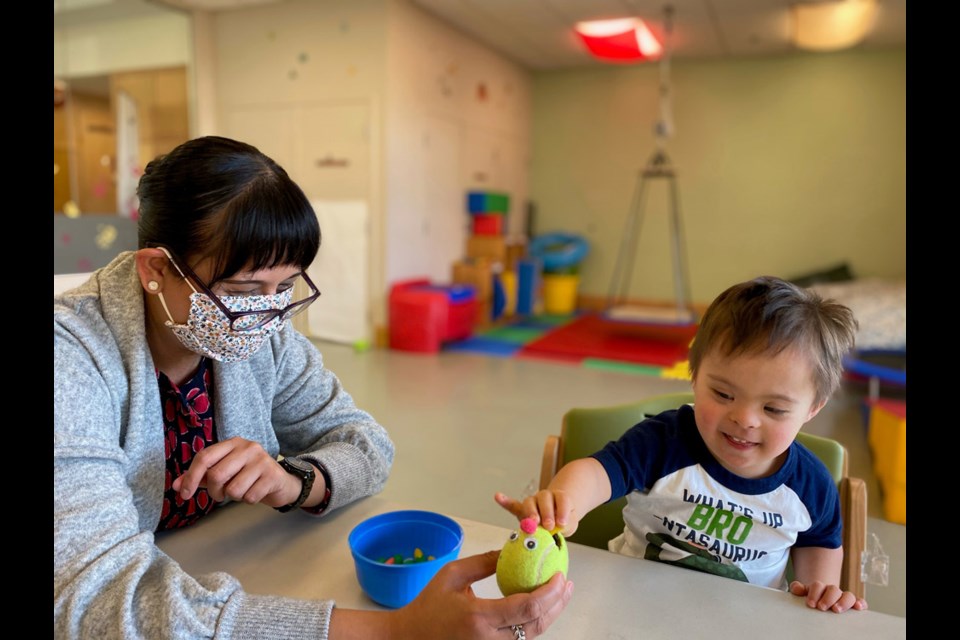A 25th anniversary is usually cause for celebration. But when that anniversary lands in a year of a global pandemic, it would be an understatement to admit that any celebratory plans necessitate a change.
“The COVID crisis completely upended everything we had planned for this very special year,” explains Wayne Leslie, CEO of the Down Syndrome Resource Foundation (DSRF), in a video that premiered at a virtual version of DSRF’s annual Up the Down Market fundraising dinner.
The lockdown restrictions also completely changed the way the Lower Mainland-based DSRF delivers their services – something the organization achieved surprisingly quickly and effectively.
“When our normally busy classrooms emptied for spring break, we had no idea it would stay that way for the rest of the school year and even into the summer,” Leslie recalls.
Figuring out a way to serve the students and their families was imperative for the organization whose mission is to empower people with Down Syndrome to reach their full potential—from children to young adults.
“We do that through a variety of ways,” says Glen Hoos, Director of Communications
for DSRF. “First of all, we offer programs and services to individuals with Down syndrome and their families. We have both one-on-one services like speech therapy, occupational therapy and one-on-one reading and math instruction. We also have group programs. Most of those are for adults who have graduated high school. The programs prepare them to live as independently as possible and to be able to obtain meaningful employment.”
When all the DSRF staff moved to working at home by mid-March, the teachers and therapists began creating resources to move the classroom learning and therapy sessions online.
“Our dedicated staff quickly reimagined every aspect of our programs and our services,” Leslie says.
In the first few weeks of lockdown DSRF had more than 50 learn-at-home lessons available online to support parents teaching their children.
“Beyond our online offerings, it only took us to early April before we able to deliver our [previously in-person] programs and services online,” Hoos adds.
All of their group classes went online via Zoom, as well as individual services, like speech therapy, occupational therapy and one-on-one reading.
“It was very flexible to the needs of each student,” Hoos says. “Some of our students took to it quite well and were actually able to do sessions online. There were a lot of one-on-one sessions with parents to help them figure out what they could do with their kids at home and just manage to navigate the whole pandemic with their kids.”
The feedback from parents has been positive with many expressing that they felt supported by DSRF being with them right from the beginning of COVID. Many families especially appreciated the financial support from the organization.
DSRF services are pay per use and fundraising helps to keep the prices below market rates, but the services still come at a cost. The organization has on-going bursaries for families who can’t afford the fees, but at the beginning of COVID program fees were eliminated for a time.
“We basically offered everything free of charge for a few months and once things were more settled, we reinstituted our fees, but we added a new COVID bursary for families that have been hit extra hard financially during the pandemic,” Hoos explains.
If there is an upside to this time, it’s that DSRF has expanded its reach, thanks to its digital and virtual services, to the rest of B.C. and beyond.
“The remote service delivery model opened new doors,” Leslie observes. “It allowed us, for the first time, to serve clients outside our immediate geographic area. There was a learning curve to be sure but online services proved to be a lifeline for many families.”
As December is traditionally the most important fundraising period for the organization, DSRF is hoping that, in this most challenging year, people will help support their educational and therapeutic programs by donating to their DownSide Up campaign—especially as enrollment was higher this fall than the previous year.
“We’ve had a lot of hardship with the pandemic, but this has definitely been a silver lining as well,” says Hoos.



